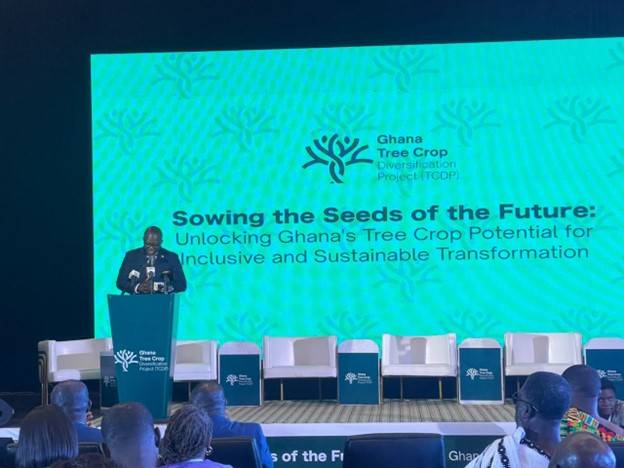Main Points In Hindi (मुख्य बातें – हिंदी में)
-
वित्तपोषण और उद्देश्य: घाना सरकार ने विश्व बैंक समूह के अंतर्राष्ट्रीय विकास संघ से 200 मिलियन अमेरिकी डॉलर का ऋण प्राप्त किया है, जिसका उद्देश्य कृषि क्षेत्र में विविधता लाकर वृक्ष फसलों की क्षमता को अनलॉक करना है। यह परियोजना काजू, नारियल, रबर, शीया, आम और ताड़ के तेल जैसी उच्च मूल्य वाली वृक्ष फसलों पर ध्यान केंद्रित करेगी।
-
समावेशिता और टिकाऊ विकास: इस परियोजना का उद्देश्य स्थानीय समुदायों और किसानों के बीच संबंधों को मजबूत करना और आर्थिक अवसरों तक पहुंच बढ़ाना है। इसमें महिला किसानों की भागीदारी को भी महत्वपूर्ण माना गया है, जिसमें 40 प्रतिशत महिलाएं शामिल होंगी।
-
बाल श्रम के मुद्दों का समाधान: GTCDP बाल श्रम के मुद्दों को पहचानने और समाप्त करने के लिए एक समग्र प्रणाली लागू करेगा। यह परियोजना डिजिटलीकरण को भी बढ़ावा देगी, जिससे बेहतर मूल्य श्रृंखलाओं का निर्माण होगा और आय के नए अवसर मिलेंगे।
-
आर्थिक लाभ और रोजगार सृजन: परियोजना से लगभग 52,775 किसानों को लाभ होगा, जिससे उनकी उत्पादकता और आय में सुधार होगा। इसके अलावा, यह अनुमानित है कि परियोजना के माध्यम से लगभग 20,000 नई नौकरियों का सृजन होगा, जिसमें 60 प्रतिशत महिलाएं होंगी।
- संस्थानिक सहयोग: परियोजना की सफलता के लिए विभिन्न सरकारी एजेंसियों, गैर-सरकारी संगठनों, निजी क्षेत्र और किसानों के बीच सहयोग ऐसे लक्ष्यों को प्राप्त करने में महत्वपूर्ण होगा। सभी हितधारकों की भागीदारी और समर्पण इस परियोजना की सफलता के लिए आवश्यक है।
Main Points In English(मुख्य बातें – अंग्रेज़ी में)
Here are the main points from the provided text:
-
Funding for Agricultural Diversification: The Ghana Tree Crop Diversification Project (GTCDP) has received a $200 million loan from the World Bank Group’s International Development Association to transform and diversify the country’s agricultural sector, focusing on high-value tree crops like cashew, coconut, rubber, shea, mango, and palm oil.
-
Goals of the Project: The GTCDP aims to maximize effectiveness and promote sustainable economic growth by supporting area-wide activities and investments in priority agricultural ecosystems. It seeks to enhance the national institutional framework and governance for tree crop sectors while fostering inclusivity among existing national institutions.
-
Targeted Beneficiaries: The project is expected to directly benefit around 52,775 farmers and their families, with a focus on improving productivity and income, particularly targeting women (40% of participants) in selected regions. It will also support small and medium-sized enterprises involved in processing cocoa, cashew, and coconut.
-
Job Creation and Environmental Impact: The initiative is anticipated to create approximately 20,000 jobs, prioritizing the employment of 60% women and involving youth while positively impacting the environment by rehabilitating degraded land and cocoa farms.
- Collaborative Approach: The GTCDP emphasizes the importance of collaboration among all stakeholders, including government agencies, NGOs, the private sector, and farmers, to create a resilient tree crop sector that supports farmers and promotes sustainable development for future generations.


Complete News In Hindi(पूरी खबर – हिंदी में)
क्रिस्टाबेल डान्सो एबेम द्वारा
सरकार ने घाना वृक्ष फसल विविधीकरण परियोजना (जीटीसीडीपी) को वित्तपोषित करने के लिए विश्व बैंक समूह (डब्ल्यूबीजी) के अंतर्राष्ट्रीय विकास संघ (आईडीए) से 200 मिलियन अमेरिकी डॉलर का ऋण प्राप्त किया है।
‘भविष्य के बीज बोना: समावेशी और टिकाऊ परिवर्तन के लिए घाना की वृक्ष फसल क्षमता को अनलॉक करना’ विषय के तहत अकरा में शुरू की गई रणनीतिक छह साल की पहल का उद्देश्य काजू जैसी उच्च मूल्य वाली वृक्ष फसलों को लक्षित करते हुए कोको से परे कृषि क्षेत्र में विविधता लाना है। , नारियल, रबर, शीया, आम और ताड़ का तेल।
खाद्य और कृषि मंत्री डॉ. ब्रायन एचीमपोंग के अनुसार, इस परियोजना का उद्देश्य प्राथमिकता वाले कृषि-पारिस्थितिक क्षेत्रों में क्षेत्र-व्यापी गतिविधियों, सुधारों और निवेशों का समर्थन करना है ताकि प्रभावशीलता को अधिकतम किया जा सके और टिकाऊ आर्थिक विकास के लिए वृक्ष फसलों के क्षेत्र के राष्ट्रीय संस्थागत ढांचे और शासन को बढ़ाया जा सके। , सामाजिक और पर्यावरणीय परिणाम।
इसके अलावा, यह वृक्ष फसल विकास में मौजूदा पहलों को बढ़ाने के लिए खाद्य और कृषि मंत्रालय (एमओएफए), घाना कोको बोर्ड (सीओसीओबीओडी), वृक्ष फसल विकास प्राधिकरण और अन्य हितधारकों जैसे मौजूदा राष्ट्रीय संस्थानों का लाभ उठाकर समावेशिता को बढ़ावा देना चाहता है।
उन्होंने आगे कहा कि GTCDP, जिसे MoFA की देखरेख में TCDA और COCOBOD द्वारा प्रबंधित किया जाता है, मांग-संचालित दृष्टिकोण अपनाएगा। “परियोजना सामाजिक समावेशन को बढ़ावा देने और लाभार्थी समुदायों और स्थानीय सरकारों के बीच संबंधों को मजबूत करते हुए इनपुट, सेवाओं और आर्थिक अवसरों तक पहुंच बढ़ाने के लिए मांग-संचालित दृष्टिकोण अपनाएगी”।
यह एक एकीकृत रोकथाम, पहचान और उपचार प्रणाली के माध्यम से वृक्ष फसलों के उप-क्षेत्र में बाल श्रम के मुद्दों का भी समाधान करेगा।
डिजिटलीकरण और पता लगाने योग्य मूल्य श्रृंखलाओं की स्थापना पर, डॉ. अचीमपोंग ने कहा कि यह प्रमाणीकरण को सक्षम करेगा और आय के और अवसर प्रदान करेगा।
अनुमान है कि जीटीसीडीपी से कोको, काजू, नारियल और रबर किसानों को सीधे लाभ होगा, जिससे लगभग 52,775 किसानों और उनके परिवारों की उत्पादकता और आय में सुधार होगा, जहां छह चयनित क्षेत्रों – पश्चिमी उत्तर, पूर्वी, सवाना, के ग्यारह जिलों में 40 प्रतिशत महिलाएं होंगी। बोनो, बोनो पूर्व और पूर्वी।
अन्य लाभों में समान अनुदान, तकनीकी सहायता और बाजारों तक बेहतर पहुंच के माध्यम से पांच से दस इनपुट आपूर्तिकर्ताओं और दस नर्सरी का समर्थन करना शामिल है। अनुमान है कि कोको, काजू और नारियल के प्रसंस्करण में शामिल 185 छोटे और मध्यम आकार के उद्यमों को भी लाभ होगा।
इसके अतिरिक्त, इस परियोजना से प्रति नौकरी 4,200 अमेरिकी डॉलर के निवेश पर लगभग 20,000 नौकरियां पैदा होने की उम्मीद है, जिसमें 60 प्रतिशत महिलाओं को रोजगार देने और युवाओं को शामिल करने और कृषि वानिकी के माध्यम से खराब भूमि को बहाल करने और नष्ट हुए कोको फार्मों का पुनर्वास करके पर्यावरण पर सकारात्मक प्रभाव डालने पर महत्वपूर्ण ध्यान दिया जाएगा।
सेक्टर मंत्री ने सहयोग के महत्व पर प्रकाश डाला और निर्धारित लक्ष्यों को प्राप्त करने के लिए सरकारी एजेंसियों, गैर-सरकारी संगठनों, निजी क्षेत्र और किसानों सहित सभी हितधारकों से एकजुट होने का आह्वान किया।
उन्होंने कहा, “एक साथ मिलकर, हम एक लचीला वृक्ष फसल क्षेत्र बना सकते हैं जो किसानों का समर्थन करता है, पर्यावरण की रक्षा करता है और आने वाली पीढ़ियों के लिए सतत विकास को बढ़ावा देता है।”
टिप्पणी करते हुए, देश के निदेशक – विश्व बैंक, रॉबर्ट टालिएर्सियो ओ’ब्रायन ने कहा कि जीटीसीडीपी उत्पादकता और बाजार पहुंच में सुधार पर ध्यान केंद्रित करता है; कमोडिटी बाजार की मांगों के साथ-साथ संस्थागत मजबूती, मूल्य श्रृंखला प्रशासन, के आधार पर मूल्य-संवर्धन और प्रसंस्करण में निजी क्षेत्र की प्रतिस्पर्धात्मकता में वृद्धि।
उन्होंने कहा कि विश्व बैंक के इन हस्तक्षेपों का उद्देश्य कृषि को आधुनिक बनाकर, औद्योगीकरण में तेजी लाकर और जलवायु लचीलेपन और शमन को प्राथमिकता देकर अर्थव्यवस्था में विविधता लाने और बढ़ने के घाना के प्रयासों का समर्थन करना है।
“वे राष्ट्रीय मध्यम अवधि विकास नीति ढांचे (2022-2025) और ‘घाना बियॉन्ड एड’ सुधार एजेंडे के उद्देश्यों के साथ संरेखित हैं।”
श्री ओ’ब्रायन ने आगे स्थापित किया कि जीटीसीडीपी की सफलता सभी हितधारकों की भागीदारी और समर्पण पर निर्भर करती है, और यह सुनिश्चित करने के लिए विश्व बैंक की प्रतिबद्धता दोहराई कि परियोजना सभी घानावासियों के लिए दीर्घकालिक, साझा लाभ प्रदान करती है।
जोसेफ बोहेन ऐडू, मुख्य कार्यकारी अधिकारी (सीईओ) – COCOBOD ने दोपहर के भोजन के दौरान अपने भाषण में खुलासा किया कि COCOBOD ने 27.5 मिलियन अमेरिकी डॉलर का एक समकक्ष योगदान दिया है, जिसका उद्देश्य यह सुनिश्चित करना है कि परियोजना का पूरा लाभ मिले। प्राप्त किया और परियोजना के प्रभावी और कुशल कार्यान्वयन को सुनिश्चित करने के लिए संस्थान की पूर्ण प्रतिबद्धता स्थापित की।
अपनी ओर से, टीसीडीए के मुख्य कार्यकारी अधिकारी, विलियम अग्यपोंग क्वाइटो ने विश्व बैंक और सभी हितधारकों की सराहना की। उन्होंने कहा कि जीटीसीडीपी के सभी संसाधन काजू, नारियल और रबर मूल्य श्रृंखलाओं में समावेशी और टिकाऊ परिवर्तन का समर्थन करने के लिए आवंटित किए जाएंगे।
उन्होंने कहा कि आम, ताड़ के तेल और शीया मूल्य श्रृंखलाओं को बदलने के लिए प्राधिकरण संसाधनों को आकर्षित करने के लिए नई रणनीतिक साझेदारी की योजना बना रहा है।
Complete News In English(पूरी खबर – अंग्रेज़ी में)
By Kristabel Danso Abem
The government has secured a $200 million loan from the International Development Association (IDA) of the World Bank Group (WBG) to fund the Ghana Tree Crop Diversification Project (GTCDP).
This new six-year initiative, launched in Accra under the theme ‘Sowing Seeds for the Future: Unlocking Ghana’s Tree Crop Potential for Inclusive and Sustainable Transformation,’ aims to diversify agriculture beyond cocoa by focusing on high-value tree crops like cashew, coconut, rubber, shea, mango, and palm oil.
According to Food and Agriculture Minister Dr. Bryan Achimpong, the project aims to support region-wide activities, reforms, and investments in prioritized agricultural ecological areas to maximize effectiveness and improve national institutional frameworks, governance, and the social and environmental outcomes of tree crops for sustainable economic development.
Additionally, the project seeks to enhance inclusivity by leveraging existing national institutions like the Ministry of Food and Agriculture (MoFA), Ghana Cocoa Board (COCOBOD), and the Tree Crop Development Authority, along with other stakeholders, to boost tree crop development.
Dr. Achimpong further stated that the GTCDP, managed by TCDA and COCOBOD under MoFA supervision, will adopt a demand-driven approach. “The project will enhance access to inputs, services, and economic opportunities while promoting social inclusion and strengthening the relationships between beneficiary communities and local governments,” he said.
Furthermore, it will address the issue of child labor in the tree crop sector through an integrated prevention, identification, and treatment system.
On the topic of digitization and establishing traceable value chains, Dr. Achimpong mentioned that this will enable certification and provide additional income opportunities.
The GTCDP is expected to directly benefit cocoa, cashew, coconut, and rubber farmers, improving productivity and income for around 52,775 farmers and their families, with 40 percent of women in eleven selected districts across Western North, Eastern, Savannah, Bono, Bono East, and Eastern regions.
Other benefits include supporting five to ten input suppliers and ten nurseries through equal grants, technical assistance, and improved market access. It’s estimated that 185 small and medium-sized enterprises involved in processing cocoa, cashew, and coconut will also benefit.
Moreover, the project is anticipated to create around 20,000 jobs with an investment of $4,200 per job, with a significant focus on employing 60 percent women, engaging youth, restoring degraded land, and rehabilitating abandoned cocoa farms to positively impact the environment.
The sector minister emphasized the importance of collaboration and called for all stakeholders, including government agencies, NGOs, the private sector, and farmers, to unite to achieve their goals.
“Together, we can build a resilient tree crop sector that supports farmers, protects the environment, and promotes sustainable development for future generations,” he said.
Commenting on the project, the World Bank’s country director, Robert Taliercio O’Brien, noted that the GTCDP focuses on enhancing productivity and market access while increasing the competitiveness of the private sector in value addition and processing, based on commodity market demands and institutional strengthening.
He stated that these World Bank interventions aim to support Ghana’s efforts to diversify and grow its economy by modernizing agriculture, accelerating industrialization, and prioritizing climate resilience and mitigation.
“They align with the objectives of the national medium-term development policy framework (2022-2025) and the ‘Ghana Beyond Aid’ reform agenda.”
Mr. O’Brien further established that the success of the GTCDP relies on the engagement and commitment of all stakeholders, reiterating the World Bank’s dedication to ensuring that the project benefits all Ghanaians in the long term.
Joseph Bohem Edu, CEO of COCOBOD, revealed during lunch that COCOBOD has contributed $27.5 million in counterpart funding to ensure the project’s full benefits are realized and to cement the institution’s commitment to effective and efficient implementation.
On his part, the CEO of TCDA, William Agyapong Kwaito, expressed appreciation for the World Bank and all stakeholders. He stated that all resources from the GTCDP will be allocated to support inclusive and sustainable changes in the cashew, coconut, and rubber value chains.
He also mentioned that the authority plans to attract resources for transforming the mango, palm oil, and shea value chains through new strategic partnerships.




